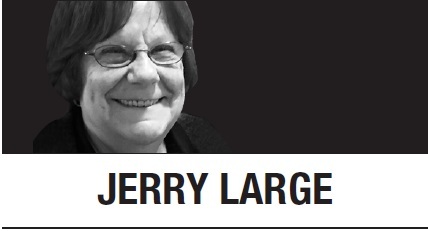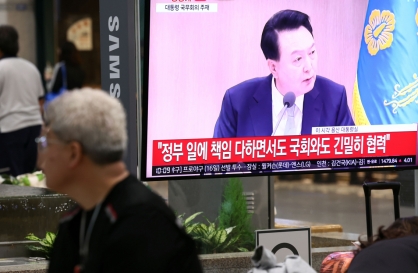[Jerry Large] US should take small steps toward peace with North Korea
By Korea HeraldPublished : Jan. 21, 2018 - 18:12
 Conflict between the United States and North Korea seems to defy solution, but that needn’t be the case.
Conflict between the United States and North Korea seems to defy solution, but that needn’t be the case.Linda Lewis, who has studied the Korean Peninsula for decades and works with North Koreans regularly, believes that sometimes the path to peace starts with small things -- interactions that help people get to know each other and build trust, opportunities to solve everyday problems and discover that it’s possible to work together.
The long enmity between the two countries has devolved into nuclear threats. That false alarm of missiles headed for Hawaii emphasized how believable such an attack has become. We desperately need to step back from that insanity.
“The Korean War is not over,” Lewis said. “I think Americans lose sight of that.” The fighting has been on pause since the 1953 armistice, but the antagonists haven’t gotten to real peace yet.
Lewis and her husband recently moved to Redmond, Wash., where he has family. Until October they’d lived for seven years in Dalian, China, from where she ran an agricultural-assistance program in the Democratic People’s Republic of Korea, as the China/DPRK country representative for the American Friends Service Committee (AFSC), a Quaker outreach organization. She now runs the program from here.
Lewis is neither a farmer nor a Quaker but a Korea scholar who shares the values that Quaker international work is built on. Quakers stress the common humanity of all people and “the power of love to overcome violence and injustice.”
Her own interest began when she was a junior in high school. Her father, a chemistry professor, was awarded a Fulbright Scholarship and took the family to spend a year in India. The program was created to foster connections and understanding between Americans and people in other countries.
Lewis loved learning about people in another culture and decided she wanted to keep doing that. She spent four years, starting in 1970, as a Peace Corps volunteer in South Korea and later earned a doctorate from Columbia University. In 1985, she began a long career teaching, most of it at Wittenberg University in Ohio, where she was a professor of anthropology and director of the East Asian studies program. She taught at the University of Washington as a visiting scholar in 1993.
Lewis joined the Quaker program in 2010 because she was impressed that AFSC focuses on places where trouble seems most intractable, Korea among them. (American nongovernmental organizations can’t be based in North Korea, but Lewis has made 15 visits to the country and meets regularly in China with North Korean partners.)
When I spoke with Lewis on Tuesday, she said engagement and normalization of relations between the United States and North Korea is our best hope for peace.
“Korea remains the last Cold War outpost,” she said. The Germanys are united, the Soviet Union is gone, but we are still facing off across the 38th parallel. Sanctions and threats have only maintained the decades-long insecurity.
The American Friends Service Committee believes getting the United States to take some small steps is the key to improving circumstances on the Peninsula. Lewis cited a quotation from former South African president Nelson Mandela, “If you want to make peace with your enemy, you have to work with your enemy. Then he becomes your partner.”
She said there are steps the United States could take on several issues: It could work to restart a program to find and return the remains of US soldiers lost in the North during the fighting, to help reunite families that were divided when people were displaced from the North, and to allow people-to-people exchanges, for instance in sports and the sciences.
Meanwhile, AFSC continues its agricultural work because food is a crucial need in the North. The AFSC helped several farms build greenhouses to protect plants from the cold, and it is training farmers to use sustainable-farming techniques that will preserve soil quality.
She said the farmers there, like farmers elsewhere, tend to be conservative, reluctant to adopt new methods because so much is at stake. It takes a little convincing for them to take a risk at first. The work helps people feed themselves as it establishes trust and relationships that might someday contribute to a peaceful resolution of more difficult problems.
The only course of action that makes sense is to build, bit by bit, toward peace.
By Jerry Large
Larry Large is a columnist for the Seattle Times. -- Ed.
(Tribune Content Agency)
-
Articles by Korea Herald






![[From the Scene] Monks, Buddhists hail return of remains of Buddhas](http://res.heraldm.com/phpwas/restmb_idxmake.php?idx=644&simg=/content/image/2024/04/19/20240419050617_0.jpg&u=20240419175937)








![[From the Scene] Monks, Buddhists hail return of remains of Buddhas](http://res.heraldm.com/phpwas/restmb_idxmake.php?idx=652&simg=/content/image/2024/04/19/20240419050617_0.jpg&u=20240419175937)

![[KH Explains] Hyundai's full hybrid edge to pay off amid slow transition to pure EVs](http://res.heraldm.com/phpwas/restmb_idxmake.php?idx=652&simg=/content/image/2024/04/18/20240418050645_0.jpg&u=20240419100350)

![[Today’s K-pop] Illit drops debut single remix](http://res.heraldm.com/phpwas/restmb_idxmake.php?idx=642&simg=/content/image/2024/04/19/20240419050612_0.jpg&u=)